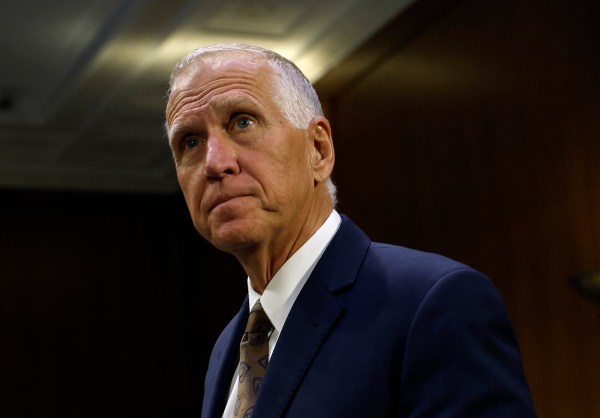Good afternoon. It was a big week for those of us who’ve been longing to visit the U.S. Botanic Garden since it closed to the public two years ago—the garden will fully reopen on April 1.
Russia Trade Bill Held Up in Senate
Kentucky GOP Sen. Rand Paul is being Rand Paul again. At least, that’s what you may have read online yesterday, when it became clear he would be holding up the House-passed bill to strip Russia of its permanent normal trade status with the United States. And it’s true, to a large extent: He’s demanding changes to the underlying bill itself to move forward, rather than being placated by a vote on his amendment.
Under Senate rules, unless all senators agree to move ahead through an expedited process, it can take a decent chunk of time for various measures to come to a final vote. Paul frequently throws wrenches into situations like this, and his move this time means it could be more than a week before the bill, which would effectively hike tariffs on many Russian products, passes into law. But there’s an important timeline leading up to this standoff we shouldn’t miss—one that highlights the realities of legislating as lawmakers seek a quick response to Russia’s war on Ukraine.
Not only did the White House and Democratic leaders scuttle a House vote on a more focused bill to end Russia’s normal trade treatment earlier this month, but the bill House leaders introduced once they had President Joe Biden’s approval also included new changes to presidential sanctions authorities, which is Paul’s hangup. Those changes opened the bill up to a delay like this one. We mentioned the sanctions powers debate in last Friday’s Uphill, and a few folks in the comments asked us to explain it in more detail. We hope you’ll bear with us here as we look at how this has unfolded over the past couple of weeks.
The timeline:
-
On March 7, the top Democrats and top Republicans on the House Ways and Means and the Senate Finance committees said they had reached a deal for a bill that would end Russia’s trade treatment and ban Russian oil imports. This agreement had backing from leaders in both parties, and House Democratic leaders said the day it was announced that they planned to hold a vote on it later that week. It was written with a strict focus on the trade provisions and an oil ban. (The deal’s original text is here.)
-
Soon after the announcement, the White House urged Democrats to halt the bill, including its primary trade component.
-
On March 9, the House overwhelmingly passed a ban on Russian oil imports, but only after removing the trade provisions the White House had objected to. The bill also included something that wasn’t in the bipartisan, bicameral deal the committee leaders had made: a permanent reauthorization of the 2016 Global Magnitsky sanctions law, which empowers the government to slap sanctions on people responsible for human rights abuses around the world. Magnitsky is set to expire in December. Under the changes, Congress would no longer have to reauthorize the sanctions authorities every few years. It also broadened the language for human rights abuses that can lead to sanctions, giving the executive branch more power to target people abroad.
-
Biden announced a few days later that he would support the trade provisions his own White House had scuttled. He said the pause was because he wanted to present a united front with international allies, who had agreed by that point to take similar action. But the week was over in the House, and a new vote would have to come the next week.
-
On March 17, the House passed a new bill scrapping Russia’s normal trade status. Leaders also again added the Magnitsky language to the legislation. The changes to Magnitsky are not very controversial, or at least not controversial when paired with a Russia response bill: The trade measure passed 424-8, after all. But a handful of right-wing members of Congress voted against it because of the expanded scope of sanctions authorities. Rep. Thomas Massie, a Kentucky Republican, told The Dispatch after his vote that he opposed it because the language would give more power to current and future presidents.
That brings us to this week, when Paul objected to quick passage of the bill for the same reason. The faction that voted against the bill because of the sanctions language couldn’t slow it down in the House, but again, because of the Senate’s rules, any one senator with those views can hold it up there.
This isn’t as much a partisan squabble—Paul and the libertarians vs. Biden and the Democrats—as much as it is a fight between branches of government. The executive branch would like more power to impose human rights sanctions around the world, without the threat of expiration every few years. Some members of Congress, fearing the potential for overreach, do not want to give more power to the president.
In fact, this isn’t some new power grab by Democrats: The language the House bill incorporated last week would codify the approach taken in an executive order by former President Donald Trump. That executive order, which is still in effect, widened the scope of people who can be sanctioned under the Magnitsky act, and it didn’t offer a clear definition of “serious human rights abuse.”
Paul and his allies fear that unclear phrasing, once explicitly approved by Congress, could open the door to future sanctions on foreigners who, for example, deny access to abortions.
Codifying the executive branch’s approach now could also undermine Congress’ ability to call future uses of the sanctions into legal question.
Concerns about the sanctions changes aren’t limited to just the eight Republicans who voted against it in the House and Paul in the Senate. GOP Sens. Mike Lee, Marco Rubio, and James Lankford introduced an amendment to the trade bill this week for a clean reauthorization of the Magnitsky powers, with a new sunset in six years.
And New Jersey GOP Rep. Chris Smith, an original sponsor of the Global Magnitsky act, said before the House voted on the new language that the tweaks “should not be in here” and it was an “egregious mistake.”
“Under the new language, the president may impose sanctions on any individual if responsible for or complicit in what they call ‘serious human rights abuse,’” Smith said. “Exactly what does that mean? There’s no definition. How is that phrase defined? How elastic is it? Especially when it’s not linked to any international treaty or covenant.”
Many readers of this newsletter can likely sympathize with both the importance of the Magnitsky authorities for promoting international human rights, and with concerns about giving the executive branch broad powers. Setting the details of the debate aside, the fact remains: The Magnitsky law does not need to be reauthorized until December. And the executive branch has been operating under the executive order’s broader language about human rights abuses for nearly five years; codifying it isn’t exactly urgent. Adding it to the trade legislation only created new opportunities for delays in Congress, even as lawmakers should be moving as deliberately and quickly as possible to respond to Russia’s brutal war in Ukraine.
Who Deserves Normal Trade Status?
The effort to pass legislation revoking Russia’s trade status might renew another related debate: A group of lawmakers is pushing for a similar bill to strip China’s trade status.
How to balance human rights concerns with trade policy is a perennial question on Capitol Hill, particularly when it comes to China. The question played out frequently beginning in the 1980s, when Congress had to decide whether to reauthorize China’s trade status each year before China joined the World Trade Organization. For the two decades since, China has enjoyed permanent normal trade status. A bill introduced this week by Rep. Chris Smith—the same New Jersey Republican mentioned above, and a longtime proponent of human rights in China—would end that.
Sponsors of the bill believe ending favorable trade treatment for China is more urgent now than ever. Not only is China remaining close to Russia despite Putin’s unprovoked war in Ukraine, but the Chinese government has also for years been carrying out its own atrocities in the northwest region of Xinjiang.
China is conducting a genocide, arbitrarily detaining more than 1 million Uyghurs and other ethnic minorities in concentration camps since 2014. The Chinese government has aggressively sought to slash Uyghur birth rates, using forced abortions and forced sterilizations. Chinese officials are also using ethnic minorities in a sprawling slave labor regime that has tainted many of the world’s largest brands and key industries.
“Many if not most business and political leaders have long bought into the ‘China Fantasy’ that overlooks human rights abuses while asserting that increased trade will make China more like us,” Smith said when he announced the legislation. “It was not true then and it’s not true now.”
Republicans Strategize for 2022
My colleague Audrey has spent a few days this week in sunny Florida, reporting on the House GOP conference’s policy and planning summit. She has a story on the site this morning about Rep. Elise Stefanik’s first year in the role of conference chair, after GOP lawmakers booted Wyoming Rep. Liz Cheney from the job.
“She’s just—I think—a little bit hungrier to prove that she is a good messenger for the conference, and that trickles down to making sure all of her members are singing the same song on TV and on radio and on social media,” one GOP staffer said of Stefanik.
Read Audrey’s piece here.






Please note that we at The Dispatch hold ourselves, our work, and our commenters to a higher standard than other places on the internet. We welcome comments that foster genuine debate or discussion—including comments critical of us or our work—but responses that include ad hominem attacks on fellow Dispatch members or are intended to stoke fear and anger may be moderated.
With your membership, you only have the ability to comment on The Morning Dispatch articles. Consider upgrading to join the conversation everywhere.